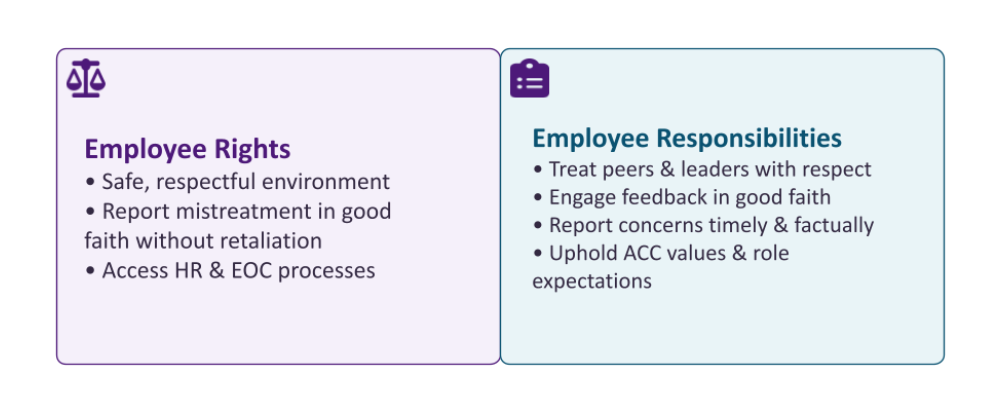
This chart lists your options for reporting concerns or complaints.

Rights
Fair Treatment and Equal Opportunity
- You have the right to work in an environment free from discrimination, harassment, and retaliation based on protected characteristics, such as race, color, religion, sex, national origin, age, and disability.
- Equal opportunity for employment, promotion, and professional development.
Practical Steps if You Believe You’re Being Mistreated
- Stay safe & remove yourself if needed
- Document facts: dates, times, witnesses, evidence
- Seek feedback: supervisor, next‑level, HR BP, mentor
- Try informal resolution if safe
- Report formally (supervisor, next‑level, HR, EOC)
- Retaliation is prohibited
Performance and Accountability
Private Discussions: Disciplinary actions occur in private meetings focused only on feedback or action. Supervisors should state this purpose at the start and remain available for questions or support.
Right to Disagree: Employees may disagree with disciplinary decisions. Supervisors should schedule a separate meeting to hear and consider employee feedback.
Support Resources: Either party may request assistance from a next-level supervisor, Human Resources, the Employee Relations Officer, the Office of Equal Opportunity Compliance, or the Ombuds to maintain respectful and productive dialogue.
Types of Disciplinary Actions
Termination: May occur after documented failure to meet expectations or in cases of severe misconduct. Requires approval from the next-level supervisor, divisional Vice Chancellor, and Vice Chancellor of Human Resources before proceeding in Workday.
Verbal Counseling: Private discussion to outline concerns and corrective steps; may be summarized in writing for clarity.
Written Warning: Formal documentation of ongoing or serious issues, required improvements, and consequences; recorded in Workday.
Probation: Set period to achieve improvement; limits on transfers, promotions, and nonessential duties; requires regular supervisor check-ins.
Suspension: May occur with or without pay for serious misconduct while fact-finding or further review takes place.
- Compensation and benefits
- Be paid accurately and on time for all work performed.
- Receive information regarding your compensation, including pay rates, deductions, and payment schedules.
- Access information about the college’s benefit programs, such as health insurance, retirement plans, and paid time off.
Responsibilities
Professional Conduct and Ethics
- Treat all members of the college community—colleagues, students, and visitors—with respect, integrity, and courtesy.
- Adhere to the College’s code of conduct and professional standards.
- Avoid conflicts of interest.
- Maintain confidentiality of sensitive information, including student and personnel records, as protected by law and College policy.
Compliance and policy adherence
- Comply with all federal, state, and local laws, as well as college policies and procedures.
- Attend and participate in required meetings.
- Understand that the employee handbook is a guiding document and not an employment contract.
- Maintain open, effective and respectful communication with your supervisor and colleagues.
- Collaborate with coworkers to support the College’s mission and goals.
- Direct work-related complaints or grievances to the appropriate supervisor or human resources staff.
- Follow College communications (Employee Town Halls, Campus Conversations, newsletters, etc) to stay abreast of changes to policies and procedures.
Human Resources:
- Mojo Ticketing System
- hrsupport@austincc.edu
- 512-223-7572
- HR Business Partners:
- Erica Breedlove – 512-738-2690
- Donald Jackson – 737-733-2522
- Aly Wang – 737-232-0973
Please remember to exclude any confidential information, such as FMLA or ADA information, in written communications.
Ombuds
For off-record and confidential guidance
Employee Relations Officer (ERO)
May provide guidance and support, in addition to assisting with a consultation referral, pursuing mediation, or filing a grievance.
When There’s Conflict
Conflict is an inevitable outcome when you bring together people with different backgrounds, goals, and personalities. The trick is knowing how to respond to it. HR uses this slide deck, called Rights, Respect, and Resilience to help teams recognize the difference between disrespect and constructive accountability, respond with courage and professionalism when things feel uncomfortable, and learn when and how to document and escalate concerns. If your team would benefit from an in-person presentation on this subject, submit your request here.
Resources
All employee rights are listed in ACC’s Board Policies, created with the assistance of the Texas Association of School Boards (TASB).
Back to Top
